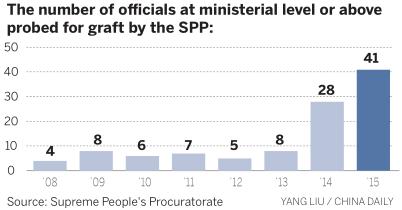Efforts to focus on safeguarding the nation's economic blueprint for the next five years
China's top prosecutors are ready to prevent corruption from derailing the nation's 13th Five-Year Plan (2016-20), according to a senior anti-graft official.
A high-level prosecutor from the revamped anti-graft bureau of the Supreme People's Procuratorate said the bureau will make a more focused effort this year on tackling corruption cases at provincial and ministerial levels and above.
The bureau was formed by merging three anti-graft authorities at the end of last year.
The prosecutor, who declined to be named, told China Daily in an exclusive interview such cases are more likely to occur in key projects involving infrastructure construction, land acquisition, restructuring and transfer of State-owned enterprises and other assets, and in healthcare and education development.
Top-level justice officials are also prepared to investigate behavior hindering or affecting the implementation of national economic strategies, the prosecutor said.
These strategies include the central government's Belt and Road Initiative to promote business ties with nations on the ancient Silk Road.

The largest key projects are listed in the 13th Five-Year Plan. But this is the first time that a top Chinese judicial professional has defined the role of the country's justice authorities under the long-term economic program.
Yao Jianlong, a law professor at East China Normal University in Shanghai, said national investment and trade projects are where government officials' power is more closely involved with the largest public funds. In comparison, the authorities' financial management is still not strong enough.
Loopholes in the system are more likely to attract greed and various forms of corruption, he said.
Hong Daode, a professor at China University of Political Science and Law, said that with a reinforced staff, the anti-graft bureau formed last year can help the justice system to focus on the most dangerous type of corruption offenses.
Previously, the top procuratorate could not concentrate on the highest level of corruption due to a lack of power and staff members to overcome "institutional barriers", Hong said.
Yao said the new anti-graft mechanism can also be more effective in preventing local administrations from interfering with investigations into the most serious cases of official corruption.
According to the Supreme People's Procuratorate, 22 high-ranking officials stood trial last year under the nationwide anti-graft campaign. Another 41 were placed under investigation, a rise of 46 percent compared with 2014.
Among those who stood trial were Zhou Yongkang, the former national security chief, who was sentenced to life in prison, and Jiang Jiemin, former head of the State-owned Assets Supervision and Administration Commission, who was sentenced to 16 years.


















































